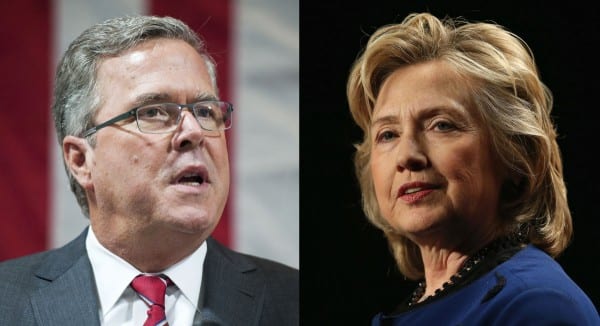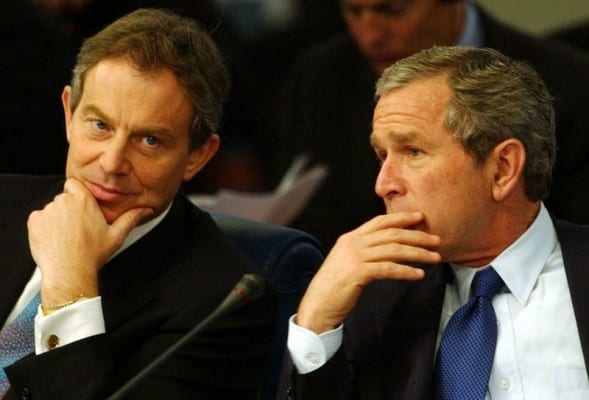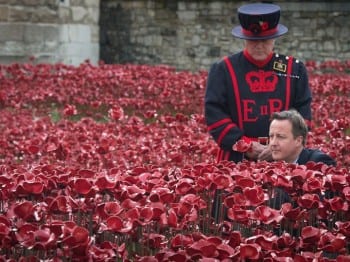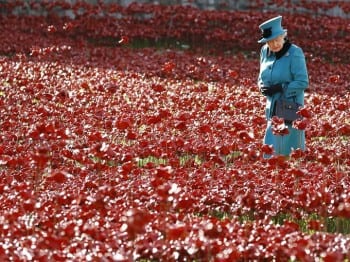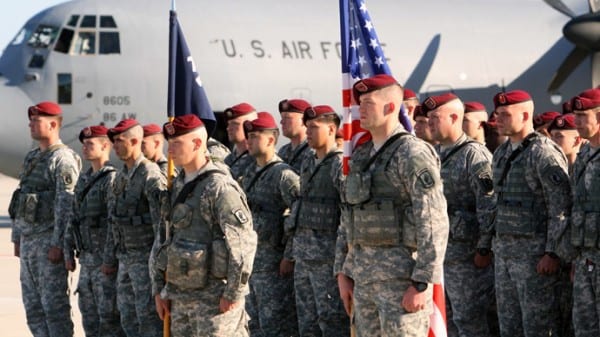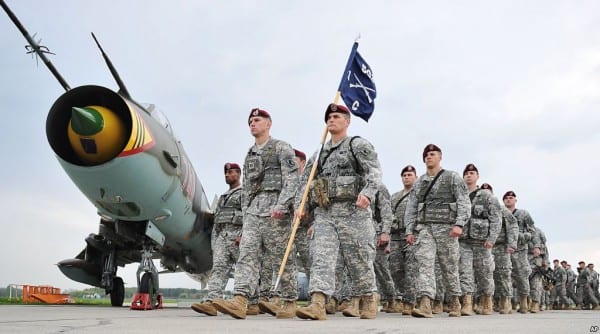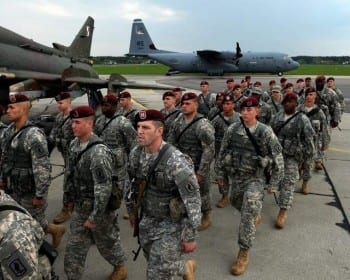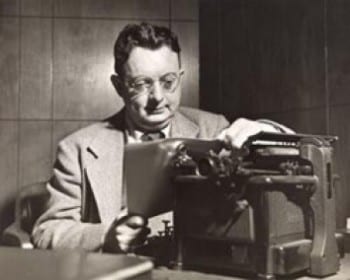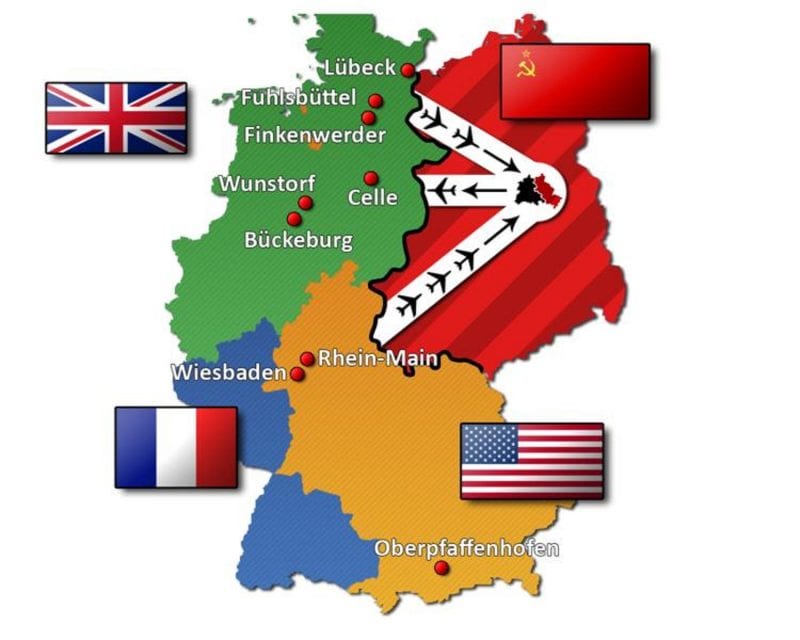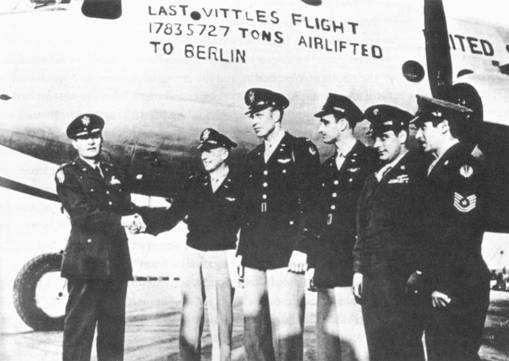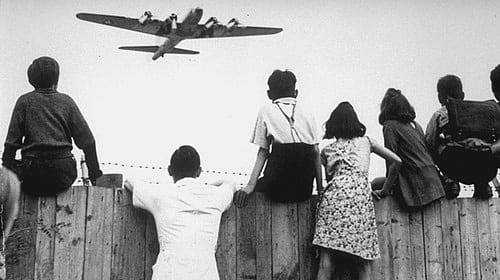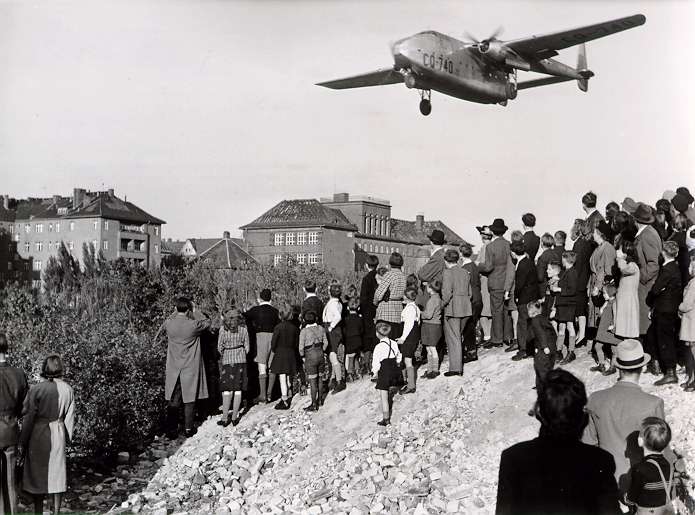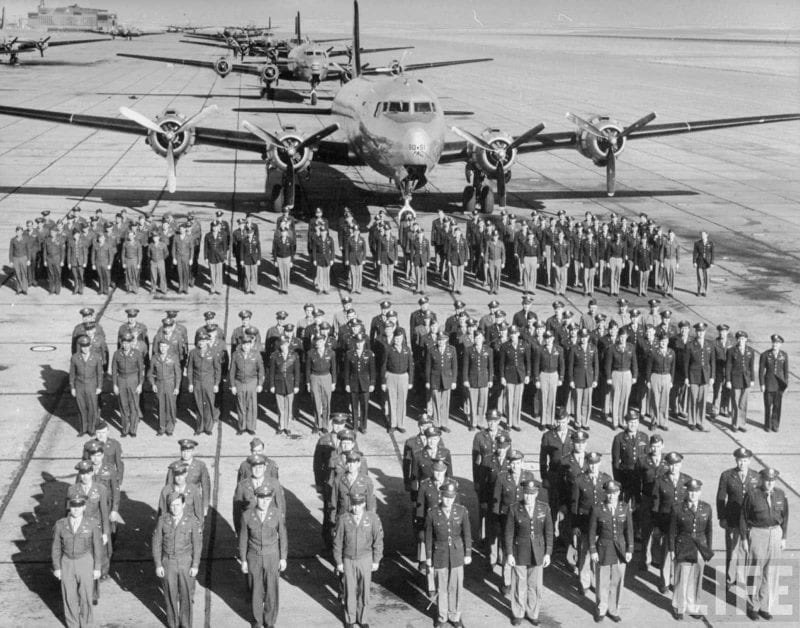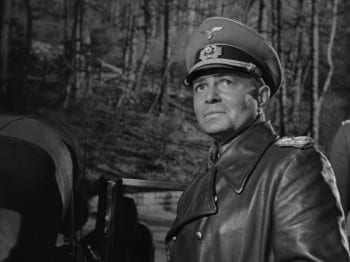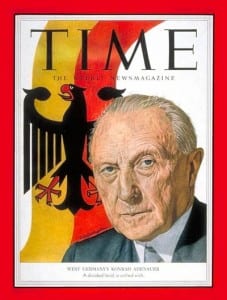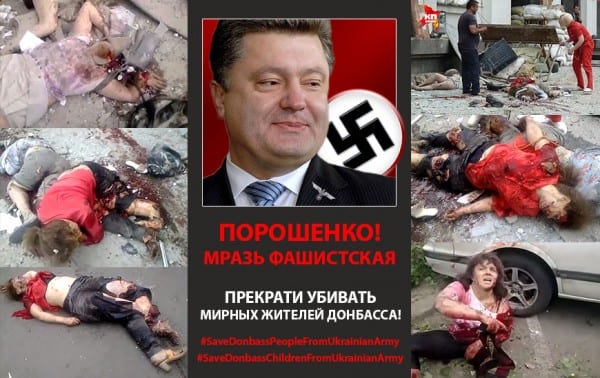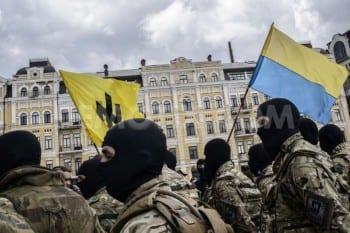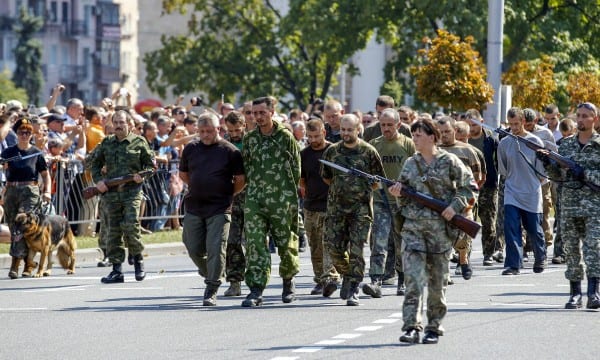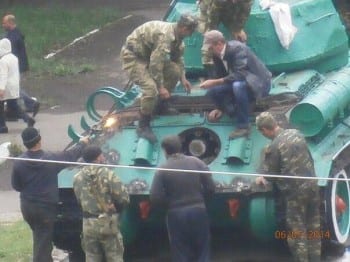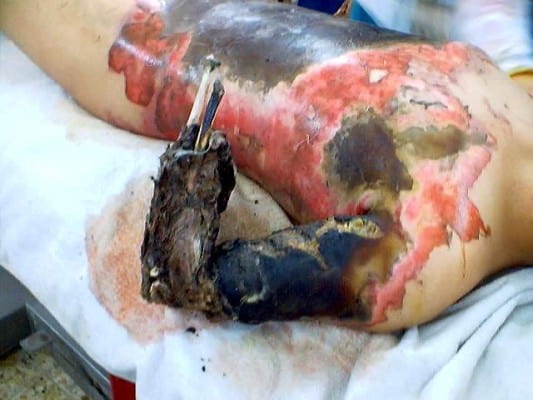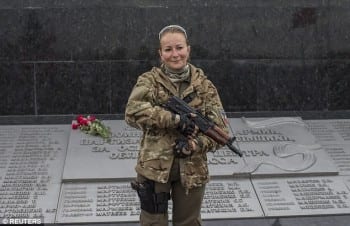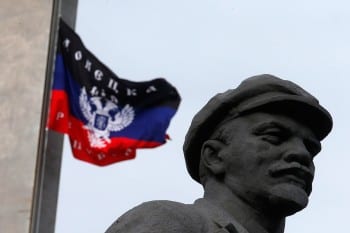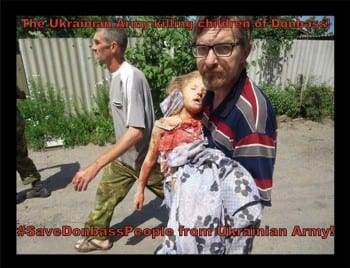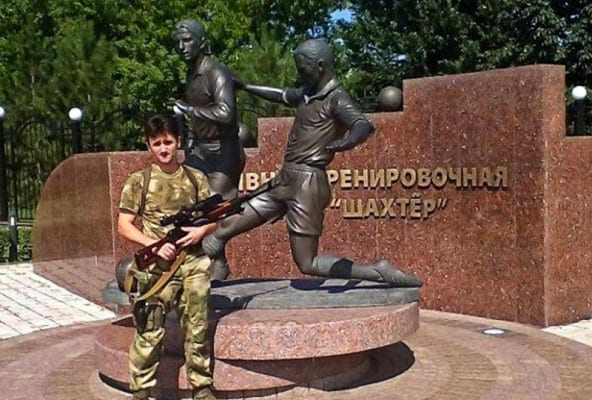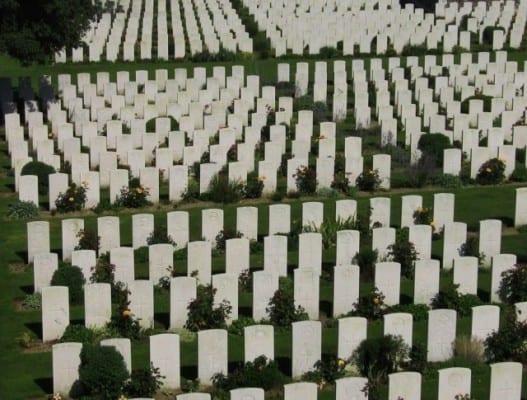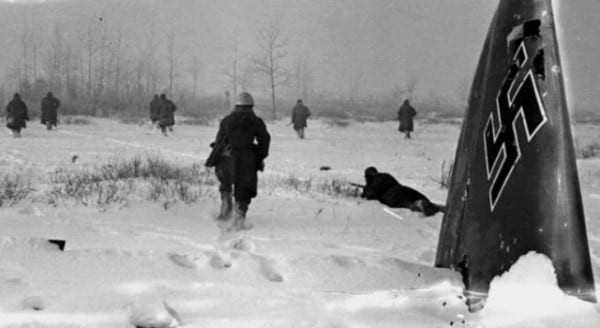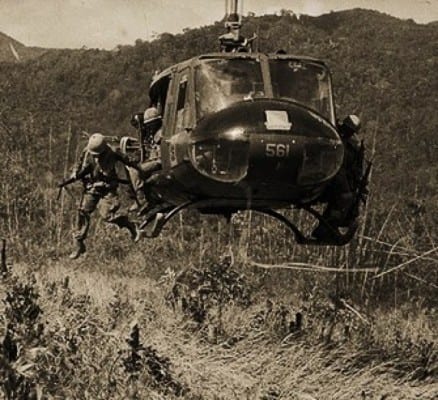For four years, we were told, the nation would have time to reflect on the meaning of the sacrifices made by British and Commonwealth servicemen who “gave their lives for their country”. To this end a long series of events, intended to foster a nation-wide mood of “reflection” and “remembrance”, would be offered for uncritical public consumption. This nostalgia-fest is now in full swing, and as was obvious from the start, very little of it has anything to do with serious reflection about the horrors and the meaning of the mass slaughter of the “Great War”. It is taken for granted that the public response (symbolized this week [9th – 15th November] by the ubiquitous poppies that are now de rigueur adornments in the lapels of every TV presenter as a sign of “remembrance” and respect) will echo the reverential, patriotic stance struck throughout the media leading up to the November 11th anniversary of the 1918 armistice.
[dropcap]Sixty four[/dropcap] years ago the outbreak of the second world war in Europe saw the first use of a new method of warfare. The Nazis called it blitzkrieg – lightning war. The term expressed a terrible reality. An overwhelmingly powerful concentration of armour, especially tanks, fighter planes and bombers, was directed against a perceived enemy, usually much weaker. The ‘enemy’ was pulverised in short measure. In 1939 and 1940 blitzkrieg was directed with devastating effect against Poland, Denmark, Holland, Belgium and, finally, France. Later, in 1941, blitzkrieg was unleashed against Greece and Yugoslavia – and finally, in the real war, which put an end to blitzkrieg – against the Soviet Union.
Today the armed forces of the United States, backed by those of the United Kingdom, stand poised to unleash blitzkrieg against Iraq. The US and the British governments assume, plausibly, that it will all be over very quickly and that within a few weeks at most, Iraq will be occupied and ‘liberated’ from the Ba’athist tyrant. Whatever the outcome may be, let us be clear that this will not be a war in any serious sense of the term. It will not involve two sides, both capable of inflicting serious damage on each other. It will be a turkey shoot. The most powerful military machine in the world is about to crush a weak, fifth rate state that poses no threat to the U.S. or Britain and, despite claims to the contrary, does not possess adequate means to defend itself. The military outcome is not in doubt.
For several months, in the build up to this attack on Iraq, we have been subjected to what can only be described as a sustained propaganda barrage to justify the coming war. When it is over, those who have promoted it – primarily, the US and British governments, backed by much of the media – will hope that the anticipated ‘victory’ will drown, in a chorus of self congratulation, all the misinformation, lying and hypocrisy that have preceded the resort to force. Bush, Blair and their supporters must be hoping that memories are short and that the millions who have demonstrated globally against this war will disperse in embarrassment and disarray. Blair, in particular, now facing the most serious predicament of his premiership, will be hoping that ‘victory’ will cast into oblivion his defiance of the United Nations’ Security Council and dispel any current concerns about the war’s legality.
However it may turn out – and it would be rash to discount the dangers of serious political and social unrest in various countries once the war starts, to say nothing of the stimulus it may give to further acts of terrorism against states backing the war – it is important to challenge the propagandists and to expose their campaign of misinformation, hypocrisy and lying.
The US government initiated the war drive against Iraq. The determination to invade Iraq and depose Saddam Hussein pre-dates September 11th. The Republican cabal that helped to get Bush into office included this as one of their objectives as long ago as 1996. Their larger objective was to establish the unchallengeable political and military hegemony of the US on a global scale. When we consider Bush’s role we should never forget that his presidency lacks legitimacy. In Britain, all serious political commentators at the time of his inauguration (including the editors of The Observer, which now supports his war) stated quite unequivocally that he had ‘stolen’ the presidential election and that the true victor was Al Gore. Bush was not properly elected; he was ‘selected’ president by a three to two majority when the Republican dominated Supreme Court outrageously blocked the re-counting of ballot slips in Florida. It is as well to remember this. It is not a trivial or pettifogging point. Bush is not legitimately president of the United States. I shall therefore refer to him as ‘president’ Bush.
https://www.greanvillepost.com/videos/CBS-GWBush.flv
[/learn_more]
REGULAR ARTICLE CONTINUES HERE
‘President’ Bush, on the basis of the evidence I have seen, is not competent to hold high office in any country, let alone to hold the office, which, we are told, makes him the most powerful man in the world. The Bush junta (Cheney, Perle, Rice, Rumsfeld, Wolfowitz, et al ) collectively constitute about the most right wing group of politicians at the centre of any government in American history. They are not a pretty bunch. Bush himself is a fundamentalist Christian with a seriously limited grasp of world affairs. One would have hoped that governments in Europe and elsewhere would have thought very carefully before lining up behind Bush and co. in an enterprise as dubious as their planned attack on Iraq. Many obviously have thought carefully and refused to be drawn in. Unfortunately the British government is amongst the minority that have not exercised such restraint.
September the 11th 2000 was a criminal atrocity perpetrated against thousands of innocent Americans and the reaction to it on the part of all reasonable people throughout the world was one of horror and abhorrence. The need to apprehend those responsible and to take appropriate measures to prevent such things happening again is perfectly understandable and justified.
However, to make September the 11th the casus belli for whatever action the Bush administration decides to take in the name of ‘war against terrorism’ is neither justified nor supportable. September the 11th is clearly being exploited in support of the war against Iraq. Neither the British nor the U.S. governments have produced any convincing evidence to link Iraq with Al Qaeda and it seems extremely unlikely that there is such a link.
What is the aim of the war against Iraq?
The main aim of the Bush junta is ‘regime change’. There are also other aims. Gaining US control of Iraq’s oil resources is not the only objective, but it is a pretty obvious one. To install a government in Baghdad that facilitates US access to the second largest oil reserves in the world, certainly plays a part in the Bush junta’s calculations. Their intention to oust Saddam Hussein has never been denied.
No-one is in any doubt about the brutal nature and murderous record of the Iraqi regime – least of all those of us who have not forgotten that Saddam was armed and supported by the U.S. when he used poison gas against the Iranians twenty years ago, or that the U.S. sold him anthrax agents and the British government built his chemical and munitions factories. Saddam Hussein was just as bloodthirsty a dictator then as he is now. The brutal nature of the Iraqi regime is not the reason for the U.S. determination to overthrow it. If ‘regime change’ by full-scale invasion is so urgent now, why not then? The answer seems obvious – except to those who appear to have wilfully blinded themselves to what is obvious. In the Bush administration’s imminent attack on Iraq we are witnessing the actions of an unrestrained hyperpower determined to impose its will by military might or political and economic pressure whenever and wherever it chooses. It is part of the bid for global hegemony – for the Pax Americana of the twenty first century.
For the past few months, the supposed primary aim of the planned war has been to secure the disarmament of Iraq – to get rid of Saddam’s weapons of mass destruction, chemical, biological and nuclear. It was taken for granted that he still possessed such weapons and that nothing short of invasion would rid him of them. Bush has frequently claimed that such weapons in Saddam Hussein’s hands constituted a threat to both his neighbours and to the United States itself. In this connection, it should be noted, that other states possessing weapons of mass destruction (Pakistan, India, Israel, North Korea – indeed Britain and the USA) might also be regarded as a danger to other states.

When the demand was made by Britain and the US that Iraq must agree to the re-admission of the UN weapons inspectors, it was confidently assumed that Saddam Hussein would not agree to this. His anticipated refusal would then be sufficient to secure a simple Security Council resolution to trigger war. When he did agree it was then assumed that very soon he would place obstacles in the way of the inspectors making their work impossible, thereby triggering war.
At this point it is necessary to look very carefully at the course of events since the passage of Resolution 1441. At the time of writing (16th of March), Blair, Aznar and Bush are ensconced in the Azores in a council of war. They are going to say that a second resolution at the UN is not necessary as 1441 warns Iraq of ‘serious consequences’ that will follow from his refusal to disarm. They will then abandon the U.N. and launch the invasion of Iraq within days.
But Resolution 1441 was worded very carefully to avoid specifically committing the Security Council to sanctioning the precipitate use of force. The majority of members, including permanent members France, Russia and China, would not have voted for a motion linked to a specific date and containing an ultimatum. That is clear beyond any possibility of misunderstanding.
For several weeks, on Blair’s prompting, it has been assumed that a second resolution declaring Iraq in breach of 1441 and sanctioning the use of force would be necessary and forthcoming. Let’s consider carefully why it is, after so much emphasis on the importance of a second resolution, that Blair, Bush and Aznar are now saying that they do not need it and intend to attack Iraq without breaching the U.N. Charter. Essentially, they have been forced into a position they never expected to be in. It has to do with the stand taken by Russia, China and, particularly, France. It has also to do with the position taken by the weapons inspectors. Jacques Chirac and Hans Blix have thrown the war plans awry.
Blix
The second report in early March made clear that progress was being made and crucially argued for more time to complete the process of disarmament. Some months were needed. The whole thrust of Blix’s report was that the inspections should continue. This clearly dismayed Powell and Straw but strengthened the French and Russian position, which supported the continuation of the inspections.
The French Case
Whatever its motivation, the French position has been clear, consistent and rational. Chirac has argued that: a) the inspections are producing results and that the objective of disarming Saddam Hussein can be achieved without the resort to war; b) that Resolution 1441 does not sanction the resort to war and was not intended to do so;
c) in view of (a) and (b) any attempt to introduce a second resolution containing an ultimatum and therefore triggering war before the inspections had taken their course, was completely unacceptable and would be opposed by France.
This is a completely logical position that in no way undermines the U.N. In fact, it can be argued that the French position is soundly based on the U.N. Charter.
The vilification of France in the U.S. and in much of the British press at present is nauseating. The Daily Express, for example, on the 14th of March carried a front page advertisement offering a £5 trip to France with the message ‘Let’s invade France! They’re lousy at war but the booze is good!’ The Sun, on the same day, on its front page, juxtaposed pictures of Saddam Hussein and Jacques Chirac with the caption ‘Spot the Difference’ – with the clear implication that there was none. The utterances of the foreign secretary on the same subject are only slightly less scurrilous.
In the United States it is even worse. Such is the level to which public treatment of these issues has sunk that, apparently, ‘French Fries’ have been renamed ‘Freedom Fries’!
Monday, 17th of March
Vilification of France
It is a measure of the bankruptcy of the Bush/Blair case that they have to stoop to the puerile level that characterises their utterances against the French. In Britain, France has been singled out for especially vituperative treatment. A few weeks ago pundits such as the normally sensible and well-informed John Simpson, were confidently asserting that the French would ‘definitely’ come round to support Britain and the U.S. When it came to it, the pundits said, France would not use the veto. It was all a matter of an exaggerated Gallic amour propre. This attitude betrayed a certain disdain for France, which is quite deep-rooted in English political culture.
Then, a week or so ago, when it started to look as though Chirac might mean what he said, the smug, contemptuous smiles began to disappear from the faces of the pundits.
Horror of horrors! The French actually meant what they said! Then began the talk about the ‘unreasonable’ exercise of the veto. If France were to veto a resolution in the Security Council sanctioning war, then, it was claimed, France would be wilfully destroying the authority of the U.N. Let’s look at this ‘argument’.
What is an ‘unreasonable’ veto?
Since the foundation of the U.N. Britain has used the veto 32 times – far more often than France. But the United States has used its veto much more often. To give two examples amongst many, in June 1982 the USA alone vetoed a Security Council resolution calling for the simultaneous withdrawal of Israeli and Palestinian armed forces from Beirut, on the grounds that this plan ‘was a transparent attempt to preserve the PLO as a viable political force.’ Was that veto not ‘unreasonable’?
In 1975 the US blocked U.N. action to stop the Indonesians from committing aggression against East Timor. Was that ‘reasonable’? Reasonably or not, the founders of the United Nations agreed in 1945 to give permanent members of the Security Council the power of veto. There is no provision for member states to decide which vetoes are ‘reasonable’ and which are ‘unreasonable’ and, on that basis, to ignore the veto. Fairly evidently, those states against whom the veto is used will regard its use as unreasonable. If, on the basis of such a calculation it is deemed permissible to ignore the Security Council and act unilaterally, it is such action and not the use of the veto that flouts the procedures of the U.N.
U.S. bullying in the Security Council
As has been evident for months now, the U.S. and British governments are determined to attack Iraq come what may. Bush has been less concerned about working through the U.N. than has Blair, whose position in his own party and in the country is less secure than Bush’s in the U.S. Therefore he has been very keen to ‘work through the U.N.’. What has this amounted to in practice?
The Bush administration has had support in the Security Council from Britain, Spain and Bulgaria. Of the permanent members of the council, France, Russia and China have demanded that the inspections should be allowed to continue and have opposed any second resolution that would trigger war. As it became clear that at least one of these might use its veto, Bush and Blair began to work feverishly to ‘persuade’ six of the apparently undecided non-permanent members to support a second resolution authorising war. If this bore fruit, it could be argued that, as a majority of the members of the council supported the U.S./British stand, any veto would be ‘unreasonable’.
Although there is nothing surprising in the methods employed by the U.S. in the attempt to bring these states ‘on side’, it is worth considering them briefly, if only because both the U.S. and British governments claim that they occupy the ‘moral high ground’ in defence of their stance. The U.S. has engaged in threats, bribery and bullying to achieve its ends. This is nothing new. At the time of the first Gulf War in 1991, two Security Council members, Cuba and Yemen, voted against the use of force. With regard to Cuba, which for thirty years had suffered from a punitive U.S. blockade, there was nothing that could be done. But, following the ‘no’ vote, the Yemeni representative was told that it was ‘the most expensive vote he would ever cast’. An economic aid package was immediately cancelled. Threats of the same kind have been made against those Third World member states over which the U.S. exercises economic leverage. But, astonishingly, this time it does not appear to have worked as well. It seems that the hardening of French determination to use the veto has persuaded the ‘swing’ states to resist U.S. bullying and persuaded them that it is not worth casting their vote for war, which would very likely only exacerbate social and political tensions in their own countries where popular opinion is firmly opposed to war.
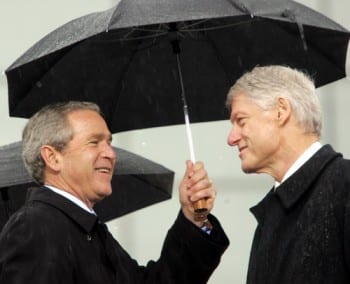
Bill Clinton and the Democrats have been aggressive in their support of George W Bush’s public image rehabilitation. The love fest, which seems to extend to most living ex presidents, continues, to the detriment of the nation’s polity.
It is in the face of the real possibility – apparently now a certainty – that the U.S. and Britain could not achieve a majority in the Security Council, that the two powers have decided to abandon the U.N. entirely, resorting to the highly dubious and contested argument that a new resolution is not needed to trigger war against Iraq. It is now being claimed that 1441 is sufficient to justify going to war without breaching the U.N. Charter and international law. In this country the government apparently has the assurance of the attorney general that 1441 provides a legal basis for war. Most other international lawyers disagree, as does U.N. Secretary General Kofi Annan.
Blair and Bush are now engaged in the most frantic verbal assaults on Chirac. Bush resorts to homespun references to Texan poker players. However well these may go down with Texans they simply confirm most British opinion in the view that ‘president’ Bush is hardly competent to lead anyone anywhere – let alone into war. Blair pointedly refuses to answer a direct question on whether a second resolution will be put to the Security Council.
This is the sorry state to which things have sunk as the U.S. and British governments prepare to take the irrevocable step into war against Iraq. Three isolated figures, Bush, Blair and Aznar, confer on an isolated island in the Atlantic. Do they really think that this will evoke memories of Curchill’s famous Atlantic meeting with Roosevelt in 1940? There has been some suggestion recently that Blair would like to appear Curchillian, and apparently Bush has been attempting to acquaint himself with Churchill’s history of the Second World War. I have a feeling that history will not look so favourably on their pretensions.
Blair’s Predicament
For weeks now the British news media have been occupied with the predicament of the prime minister. His plight has been evident for all to see. His old self-confidence has all but disappeared. He looks haggard and haunted. He has been keen to assure both supporters and critics that he is most definitely not ‘president’ Bush’s poodle. He constantly emphasises his ‘conviction’ that what he is doing is right. He firmly believes in the stand he has taken even though it is as firmly opposed by the majority of the people and has provoked the biggest public demonstration of opposition in this country’s history.
Those who support him claim that he has worked selflessly to persuade ‘president’ Bush to follow the U.N. route because, as a firm internationalist he is desperate to remain at the ‘centre of Europe’ and to prevent a breach between the E.U and the U.S.
CLICK IMAGE TO EXPAND
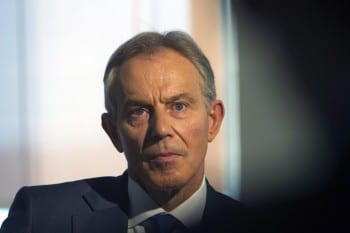
Does Blair ever reflect on the millions of lives his venality helped destroy?
As his unwavering support for Bush has severely damaged his reputation in Britain and in the rest of Europe, it is not surprising that many people have wondered why he has acted as he has. Very serious damage has been done to his European policy and his attempt to shift the blame onto the French is not likely to work. Public opinion throughout Europe is overwhelmingly opposed to war and the biggest anti-war demonstrations have taken place in those countries whose governments are supporting the U.S. – Britain, Spain and Italy.
Why has Blair, the leader of a party hated by the right wing Republican cabal surrounding Bush, linked himself so closely to the most reactionary administration in recent U.S. history? Blair himself claims that he has taken this stand because he passionately believes it to be right. He has appeared ambivalent about his motives for supporting Bush’s war against Iraq, vacillating between the need for ‘regime change’ and the need to ‘disarm Saddam’. But he has always sought to impress his critics with the strength and sincerity of his commitment. He always lays claim to the moral high ground, often implying that those who disagree with him must be less nobly motivated. He has not infrequently accused his critics of being anti-American.
But the sincerity of Blair’s commitment to the disastrous course he has chosen is beside the point. The truth-value of any belief is not determined by the sincerity with which it is held. Hitler, no doubt, believed passionately in a ‘world Jewish conspiracy’. Surprisingly, there are still those who seem to think that strong beliefs are admirable per se, regardless of what is believed. It is simply the case that Blair is wrong.
Looked at in historical perspective, the course he has chosen in supporting Bush continues the Atlanticist foreign policy stance of British governments, Labour and Conservative, since the Second World War. Attlee’s government supported the U.S. in Korea in 1950 under the nominal umbrella of the U.N.; Wilson refused to commit British troops to Vietnam but supported the U.S. war in the 1960s. When push comes to shove, the pull of the ‘Atlantic alliance’ always seems to win out over any European commitment for British prime ministers. Perhaps it has to do with a post imperial identification with the English speaking superpower and lingering resentments against former continental competitors.
The war against Iraq, however, takes British support for the U.S. to an unprecedented extreme. Never, in the past, has a British government followed a U.S. administration into war against the overwhelming opposition of its own people. Never has a British government acted in defiance of such widespread opposition in the U.N. and throughout the world. Never has a British government supported so uncritically a U.S. president as despised as the present incumbent is in Britain and throughout Europe and the world.
Blair’s arrogant self-righteousness and his insensitivity to the opinions of those who disagree with him have brought him to his present impasse. He has got himself into a position with his own party not dissimilar to that of Ramsay MacDonald who, in the crisis of 1931, almost destroyed the parliamentary Labour Party and finished up leading a de facto Conservative government in the House of Commons. Blair may very well face an unprecedented back-bench rebellion within the next few days which will leave him dependent on Tory votes to gain parliamentary approval for an illegal war. In his attempt to minimise the revolt he will try to exculpate himself by blaming Jacques Chirac!
Whatever the outcome of the war which is now imminent, the damage that Blair has wreaked on his own party will turn out to be immense. There will be mass resignations from the Labour Party. There will be resignations from the cabinet. Robin Cook, leader of the House of Commons has already resigned (17th of March) and the resignation of Clare Short, minister for overseas development, is anticipated. Tomorrow there will be a debate in parliament and there are predictions that as many as 160-170 Labour MPs will vote against the government. This will be an unprecedented revolt. Cook, in his resignation speech, is likely to challenge the legality of the war in the absence of clear U.N. authorisation. His intervention could provoke an even greater rebellion amongst Labour back-benchers. We will know the outcome tomorrow.
Tuesday the 18th of March
The promised parliamentary debate is in progress. Cook resigned yesterday and made a strong anti-war speech, though he went out of his way to praise Blair’s supposed efforts to ‘rein in’ Bush. But his resignation has been offset by Clare Short’s U turn. She has withdrawn her unequivocal threat to resign made last week, in which she repeatedly accused Blair of ‘recklessness’. She has had a change of heart and intends to stay on in the cabinet to help, as minister for overseas development, to ‘mop up’ the mess left in Iraq after the war is over. She has damaged the Labour rebels in parliament and given a crumb of comfort to Blair. Her credibility as a person of principle is finished. She is a laughing stock.
10.00.pm. The debate in the House of Commons is over. At the division, 139 Labour MPs voted against the government, for the anti-war amendment – only seventeen more than last time. All the Liberal Democrats voted for the amendment, as did the nationalists and sixteen Tories. The total vote for the anti-war amendment was 217.
396 MPs voted for the government. Twenty Labour MPs abstained. There are 410 Labour MPs in the House of Commons. 271 of them voted for a war that has no U.N. support and is opposed by the majority of the people. Nevertheless, the size of the rebellion by Labour MPs is the largest ever. Had a majority of Labour MPs voted against war, it would have had a dramatic effect, and could have forced Blair’s resignation and prevented Britain going to war. Ironically, but predictably, it was precisely this possibility that persuaded many of the doubters to support the government. On the main motion endorsing Blair’s strategy, more Labour ‘rebels’ swung back to support the government. The government won by 412 votes to 149.
In parliamentary terms Blair can therefore claim a mandate for war.
How was this result achieved? The methods used by the Labour whips were similar to those employed by the U.S. and Britain in the Security Council – blackmail and bullying. Arms were twisted; threats by Blair to resign if the vote against him was ‘too big’. Even the prime minister’s wife, Cherie Blair, who is not a member of parliament, hit the telephone lines and came into the Palace of Westminster to coax and cajole women MPs into voting for her husband. No doubt those with ministerial ambitions were told to forget it if they voted the wrong way. Of course, none of this is remotely surprising. It is part of what parliamentary politics is about. Nevertheless, it casts interesting light on the political machinations at the heart of the ‘democratic process.’
Wednesday, the 19th of March
The ‘Patriot Game’
It is now as certain as can be that the war against Iraq will start today or tomorrow at the latest. Most newspapers and television news channels are busy attempting to manufacture consent to what is about to happen. Most of the familiar pundits are brought before the cameras to pontificate about a military onslaught that we shall all be able to watch in censored and sanitised form in colour on our television screens over the coming days and probably weeks.
The anti-war protesters are in Parliament Square and their numbers are growing. A ‘stop the war’ march is planned for next Saturday in London. Other activities are planned nationwide.
It is clear now what the main thrust of pro-war propaganda will be. The ‘patriotic’ card will be played for all it is worth. Charles Kennedy, leader of the Liberal Democrats, who has led his party in opposition to any war without a second Security Council resolution, has said that once the war starts, he will support the British army. This is also the view of the Daily Mirror, which has consistently opposed the war. The build up to war has been accompanied by an emotional appeal for support for ‘our boys’ in Kuwait. In other words, those who have consistently opposed this war are now expected to defend its prosecution, as not to do so would be an unpatriotic betrayal of ‘our’ fighting forces. The Guardian’s columnist, Jonathan Freedland takes a similar view, arguing that those who, like him, oppose the war, are obliged, once it starts, to support its prosecution to a speedy conclusion to minimise the loss of life. However understandable his sentiments, it amounts to supporting the war once it starts. It seems to me that it is illogical to have strenuously opposed the war before it starts only to support it once it has started. It is not easy to stand against a rising tide of chauvinistic flag-waving, but stand against it we must. This involves no animosity against British soldiers. The opponents of war have done their best to ensure that these soldiers were not sent into battle in the first place in an unjust war. The US opponents of the Vietnam War in the 1960s and 70s were against an unjust war and many young men refused to fight in it. They were also labelled ‘unpatriotic’. We don’t want British soldiers or Iraqi soldiers or civilians to get killed. The deaths of all of them will be on the heads of those who have launched this war. The war could not be supported before it started. No amount of specious argument can justify supporting it after it starts.
What now?
The immediate task is to do everything to sustain the momentum of the anti-war movement. There will be an understandable tendency to despondency, but it should be resisted. The protests and demonstrations must continue. The movement internationally must be strengthened. The present situation is extremely dangerous, not least because of the possible repercussions in the Arab and Muslim world. There is a serious risk of further acts of terrorism against targets in Britain and the US. Such acts, if they occur, quite apart from the terrible physical damage and loss of life they will cause, will further damage the anti-war movement. They will be used to charge opponents of war with complicity with terrorism. There is likely to be a further erosion of civil liberties. The tasks of the anti-war movement are likely to be very difficult, whether the war is short or long. But the groundswell of popular anger will not be quelled so easily. The mobilisation of millions throughout the world in the past few months should give us confidence that an international movement capable of facing the challenges of the future can and must be built.
Mike Faulkner
19.03.03.
ABOUT THE AUTHOR
Mike Faulkner is a British citizen. He lives in London where for many years he taught history and political science at Barnet College, until his retirement in 2002. He has written a two-weekly column, Letter from the UK,for TPJ Magazine since 2008. Over the years his articles have appeared in such publications as Marxism Today, Monthly Review and China Now. He is a regular visitor to the United States where he has friends and family in New York City. Contact Mike at mikefaulkner@greanvillepost.com
NOTICE: YOUR SUBSCRIPTIONS (SIGNUPS TO OUR PERIODICAL BULLETIN) ARE COMPLETELY FREE, ALWAYS. AND WE DO NOT SELL OR RENT OUR EMAIL ADDRESS DATABASES.
![]()
